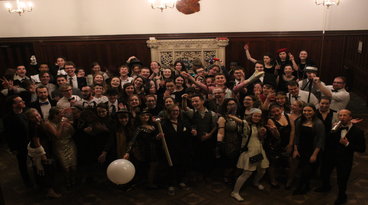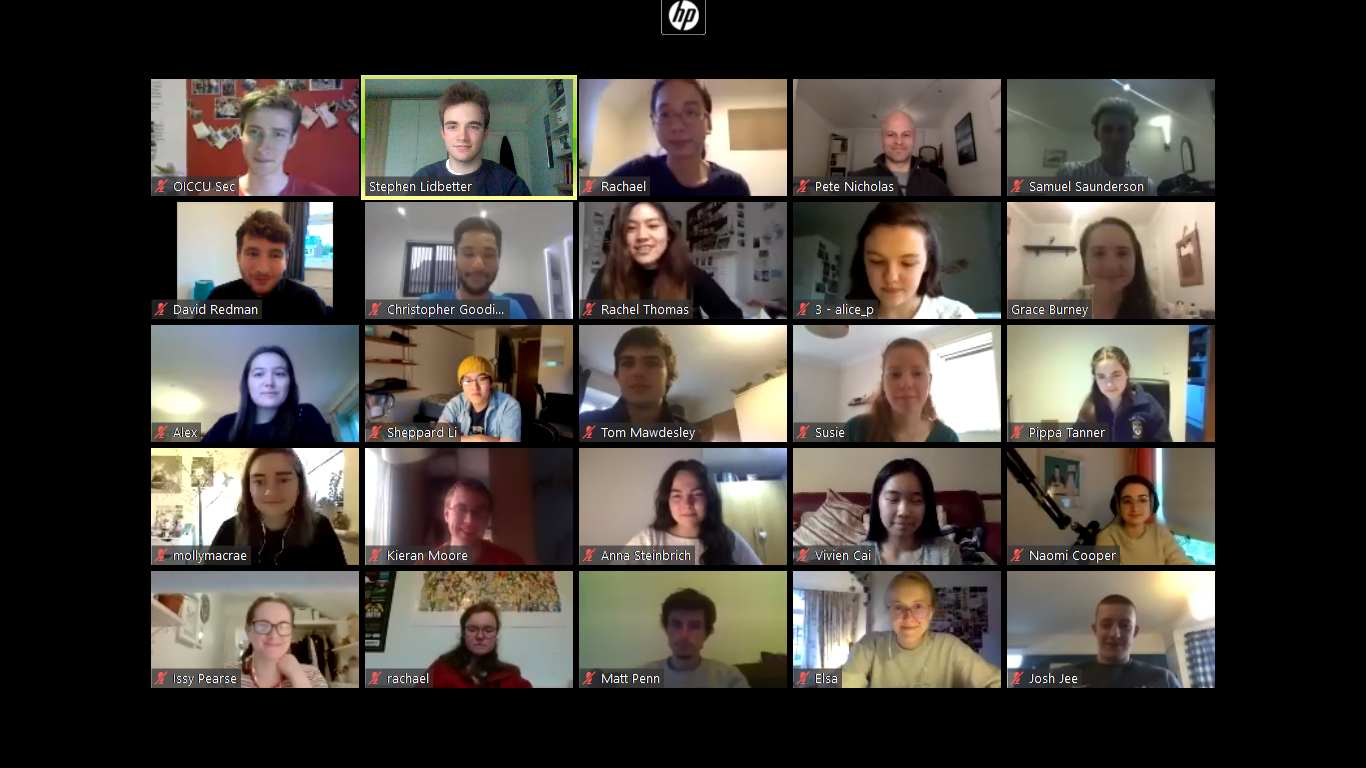
It begins with conversation: Striving for inter-ethnic unity in the CU context
The events surrounding George Floyd’s violent death have placed ethnicity and race relations back in the public eye, not only in the United States but around the world.
People of a whole range of ethnic and cultural backgrounds have been prompted to re-examine their own views and practice when it comes to relating to others. I’ve spoken with many students who’ve been provoked to ask how well British university life reflects a commitment to the dignity of all people, regardless of their skin colour.
Those in Christian Unions have all the more reason to ask these questions. As my friend Chenaiyi wrote last week, Christians hold that every human has inherent dignity and value – not just because it matches the secular creed of our day, but because of the convictions given to us in the biblical story. We have oneness in Adam – each of us created with the value that goes with being God’s image-bearers – and oneness in Christ – each saved from the same background by the same Saviour to the same glorious destiny.
Furthermore, Christian Unions are deeply concerned with unity. We take Jesus’ words seriously – that the ‘ultimate apologetic’ for the gospel is our love for one another (John 13:34-35, John 17:23). That’s why CUs gather mission teams as wide as the gospel allows – welcoming Christians from different church backgrounds, nationalities and ethnicities. We know that the university sits up and pays attention when it sees students who’d never normally pass the time of day together brought together in this gospel bond of love.
Yet maintaining our unity is hard. Paul emphasises that our commitment to preserving the unity won for us by Jesus will involve making every effort to relate to one another with humility, gentleness, patience and love (Ephesians 4:2).
Two inadequate responses: conformity and bitterness
Tari, a recent graduate in engineering from the University of Manchester, tells me of two unhelpful ways he found himself relating to his white-majority CU.
One was to feel resentment towards white British people. “As a black international student from Zimbabwe, I was coming to the land of my ‘oppressor’ – the white British person, whose ancestors sometimes used Christianity as a tool of oppression. This conjured up a bitterness to white British people.” Knowing Christ has gradually helped him change. “I’m still taking pain to God and asking for healing. But I’m convinced that we should practise forgiveness, forgiving these white students’ ancestors. Forgiveness isn’t cheap – it cost Christ’s life – and so it won’t be easy, but it is worth it.”
"Forgiveness isn’t cheap – it cost Christ’s life – and so it won’t be easy, but it is worth it.”
A second, more common response that BAME students reported was trying to hide their ethnic and cultural difference in an effort to conform. “When I joined university societies, including the CU,” Tari tells me, “the first thing I noticed were the differences between me and others. I felt compelled to mirror the behaviour of the dominant group to be accepted – unintentionally altering my speech patterns, expressions and even the tone of my voice.” Yet as students from ethnic minorities conform in this way, they can open themselves to damaging consequences. Tari says, “We can feel less valuable than ever. We may even begin to think that there’s something wrong with the colour of our skin or our cultural background – that it’s something to shed.”
Tari offers this word to white students, often the CU’s cultural majority. “It’s a deep human desire to be fully known and loved. Our culture, heritage and skin tone are all part of that. So when you say, ‘I don’t see colour’, you’re inadvertently dismissing and ignoring part of who I am. You aren’t letting me show a part of me that God fearfully and wonderfully made.”
“Non-white CU members often have different experiences – of being Christian, of Christian culture, even of living in the UK,” Precious, a student from a black African background, part of the University of York CU, tells me. “The white CU members’ norm can feel alien to a BAME Christian – from the way they pray down to the worship songs they sing. In trying to fit in, BAME students in CU can feel like we’re whitewashing ourselves, not being our complete authentic selves, caught in some kind of divide. It’s worse when no one else seems to notice, because of the majority’s own cultural blind-spots. You feel left alone to navigate uncharted waters. At times it’s overwhelming.”
Recent events have caused Emily – a white leader in a white-majority CU – to reflect on how she’s related to others as worship coordinator. “My CU often talks about focusing on what unites us, and not what divides. For the most part, it’s a really helpful attitude. But sometimes focusing on ‘what unites us’ becomes wrongly confused with pleasing the majority.” Emily talks about one situation in particular. “I was working with a singer from a different background to me. I noticed no difference in our expressions of worship. I’ve no idea whether her tradition was already similar to mine, if she’d just adapted to the white Western way of doing worship, or whether I didn’t give her space to be herself.”
"Sometimes focusing on ‘what unites us’ becomes wrongly confused with pleasing the majority.”
Working together
Sasha is a midwifery student from Hong Kong, currently studying in Leeds. Her CU is also predominantly white and says that, whilst there has been an encouraging increase in its ethnic diversity, there is further to go. Last year, she was the only person of colour serving on her CU committee. She says that white-majority CUs must not look to add diversity in their leadership team in any box-checking, tokenistic sense. Instead, they should consciously notice gifted brothers and sisters who are over-looked for CU leadership not on the basis of godliness or ability, but for cultural reasons.
Working with those who have different viewpoints from us is never easy – yet vital. “We bring different perspectives we wouldn’t have ever considered if we were doing mission alone,” says Sasha. “That is the beauty of the gospel. We can disagree but come together, learning from each other because we are equal, treasured and deeply loved in Christ.” She adds, “the grace we show each other is an extension of Christ’s grace to us. It gives us the freedom to be able to humbly seek forgiveness and start afresh.”
“We bring different perspectives we wouldn’t have ever considered if we were doing mission alone”
Tari believes this emphasis on grace uniquely forms Christian students to contend for racial reconciliation. In a world that can be self-righteous around issues of race and ethnicity, he says, Christians can go forward with both deep conviction and refreshing humility: “The gospel takes a look at evil, helps us understand it in all its dimensions, and changes our hearts and thinking so we can do something about it.”
And ethnic unity in the gospel formed by this movement of grace carries tremendous power. “It shows people that Christianity isn’t just a ‘white man’s religion’, as many have tried to argue,” Olachi, CU President at Bart’s in London, tells me, “but that, starting in Jerusalem, Christianity has reached to the edges of the world and brought together people from every race and culture. Before coming to CU, I never imagined I’d meet converts from Islam and Hinduism. I never imagined I’d meet Arab Christians. My eyes have been opened to the miraculous power of God in being able to change the most unexpected lives around for the better. University is the place where I realised that the Church really is a global family, and I hope that will also be the experience of other Black Christians too.”
It begins with conversation
Whilst virtually all CU students would say that ethnic unity is worth fighting for, Emily is representative of many who are white. “I know my life has never been made harder because of the colour of my skin – and that that’s not the case for everyone. I also know that there are areas in which I’m totally ignorant. The combination of these two creates fear initiating conversations around these issues.” She adds. “I also know that BAME students aren’t resources at my disposal when I have questions. The last thing I want to do is to be so insensitive as to ask them to educate me about the injustices they have suffered.”
Virtually all of the BAME students in CUs I spoke with conceded that conversations about ethnicity and racism can feel wearying, such is the emotional investment required. Yet, whilst welcoming the desire for sensitivity amongst students like Emily, Tari gently pushes back. “Even if questions from white friends appear insensitive at times – none of us are perfect – the fact they are asking questions makes a difference itself. Yes, bad memories can be triggered in all sorts of ways. But the fact that a white student is concerned and humbly wants to educate themselves means the world to most BAME students.” Precious adds that, without having these conversations with their BAME members, CUs may struggle to effectively reach the BAME cohort of their student body with the gospel.
White students may feel fearful about having genuine discussions about ethnicity. But, as Tari puts it, “the worst response to these fears is silence.”
Peter Dray is UCCF’s Head of Creative Evangelism. Read Chenaiyi de Cordova's thoughts on pursuing community in ethnic diversity here.











